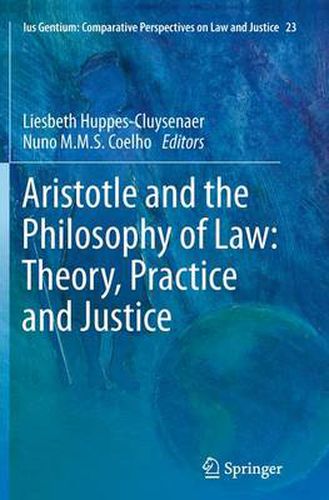Readings Newsletter
Become a Readings Member to make your shopping experience even easier.
Sign in or sign up for free!
You’re not far away from qualifying for FREE standard shipping within Australia
You’ve qualified for FREE standard shipping within Australia
The cart is loading…






This title is printed to order. This book may have been self-published. If so, we cannot guarantee the quality of the content. In the main most books will have gone through the editing process however some may not. We therefore suggest that you be aware of this before ordering this book. If in doubt check either the author or publisher’s details as we are unable to accept any returns unless they are faulty. Please contact us if you have any questions.
The book presents a new focus on the legal philosophical texts of Aristotle, which offers a much richer frame for the understanding of practical thought, legal reasoning and political experience. It allows understanding how human beings interact in a complex world, and how extensive the complexity is which results from humans’ own power of self-construction and autonomy. The Aristotelian approach recognizes the limits of rationality and the inevitable and constitutive contingency in Law. All this offers a helpful instrument to understand the changes globalisation imposes to legal experience today.
The contributions in this collection do not merely pay attention to private virtues, but focus primarily on public virtues. They deal with the fact that law is dependent on political power and that a person can never be sure about the facts of a case or about the right way to act. They explore the assumption that a detailed knowledge of Aristotle’s epistemology is necessary, because of the direct connection between Enlightened reasoning and legal positivism. They pay attention to the concept of proportionality, which can be seen as a precondition to discuss liberalism.
$9.00 standard shipping within Australia
FREE standard shipping within Australia for orders over $100.00
Express & International shipping calculated at checkout
This title is printed to order. This book may have been self-published. If so, we cannot guarantee the quality of the content. In the main most books will have gone through the editing process however some may not. We therefore suggest that you be aware of this before ordering this book. If in doubt check either the author or publisher’s details as we are unable to accept any returns unless they are faulty. Please contact us if you have any questions.
The book presents a new focus on the legal philosophical texts of Aristotle, which offers a much richer frame for the understanding of practical thought, legal reasoning and political experience. It allows understanding how human beings interact in a complex world, and how extensive the complexity is which results from humans’ own power of self-construction and autonomy. The Aristotelian approach recognizes the limits of rationality and the inevitable and constitutive contingency in Law. All this offers a helpful instrument to understand the changes globalisation imposes to legal experience today.
The contributions in this collection do not merely pay attention to private virtues, but focus primarily on public virtues. They deal with the fact that law is dependent on political power and that a person can never be sure about the facts of a case or about the right way to act. They explore the assumption that a detailed knowledge of Aristotle’s epistemology is necessary, because of the direct connection between Enlightened reasoning and legal positivism. They pay attention to the concept of proportionality, which can be seen as a precondition to discuss liberalism.